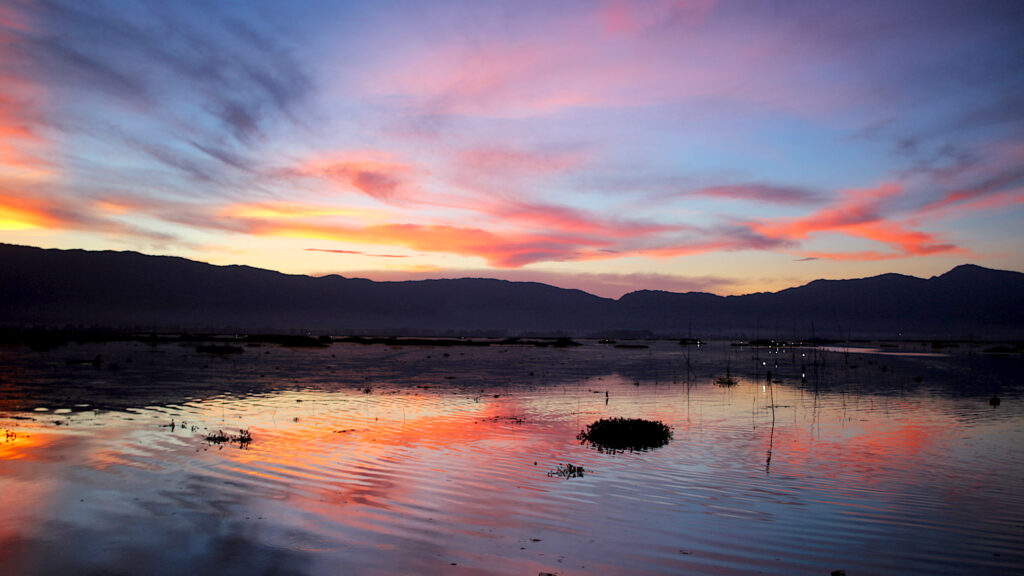Fishing for Dust

“Fishing for Dust” is part of the collection Poems of Witness and Possibility: Inside Zones of Conflict. Read the introduction to the collection here.
They keep knocking, asking her for a ransom for her long hair
and the sum of that very gold she lost as a young bride to the fire.
Intrepid souls lost within the divine gamble of swimmers, man, and fish.
This is fishing.
The wind screams in her favor, and yet even her weeping eyes stray,
helplessly trying to answer the call of what it takes to come alive
in a land where there are lines you should never cross.
Hill and valley, every day reciting their ache on the radio.
Kangleipak, our land, pays the debt of her children—
[1]
[1]
Kangleipak is the name of the ancient Meitei Kingdom. The Meitei are an ethnic group in Northeast India, Myanmar, and Bangladesh.
Those who fail to see that even their mother has a story to share.
Mother to rivers that retreat back into the mountains.
A land in which sailors cross the Loktak even in the mist, for it is their only chance at survival.
As she traverses through the thick mist to sail from island to island,
her child along with her on the boat pleads for a lullaby.
It is this pain for her child to be safe that a mother sings a lullaby
while begging him not to fall asleep or the waves may take him.
A mother as deeply compassionate as inverted mountains
is on the surface of the water herself.
She, too, claims lives, for death is destined in this realm.
What divine comedy! Life in the Meitrabak!
[2]
[2]
Meitrabak is an ancient name for what is today Manipur, a state in Northeast India.
Kangleipak is a refuge of heartbreaking tales.
Her hair is twisted and turned to noodles to feed her starving children.
She now churns the rice with oars and has her ephemeral jewels kiss the shades of time.
Her nets are cast in the dusk of life,
eager to meet the spirits of the night who wait to feast on her fabric.
Her flesh serves as the roof of bazaars in which all that remains alive
continues to arrive like she did in the mist.
Rivers that swell whip her palms,
and the paddy is so dry that even the fish never see the open water.
Hearts so broken that even a soul weeps in dust.
There is no sadness larger than the heartache of the motherland,
one so putrid yet rich,
and one mostly sold in the bazaars like fermented fish.
Her back has swept the courtyards of imperial rulers,
and her fingers have touched the eyebrows of people who have died in her body.
Her nets are cast and lifted,
awaiting the outcome that will dictate the fate of the fish.
That she, the one on this conniving lake waiting to be caught,
may be freed because she is still young.
And her old doors, they continue to be knocked with voices demanding her ancient debt—
the destiny of her children.
Her weeping pronounces the glory of her hair
that swings from the Chindwin to the Barak.
[3]
[3]
Chindwin refers to a river east of Manipur in present-day Myanmar. Barak is a river that forms the border of Western Manipur.
Her forehead is broken by the embellishments of chandan and leibak.
[4]
[4]
Chandan is a sandalwood paste. As it relates to my poem, Hindu Manipuris apply it to their foreheads. Leibak is a black mud applied as a dot on the forehead by Meitei animists, those who hold the worldview that everything in the world is sentient, or animated.
Religions bow to the mother whose thighs now press against the nets of eternity,
lifting the great fate of the kanglei debris.
Her heart, coughing in the flood of her children’s tears.
This is what dust looks like.
Rowing, the destination
is still awaiting.
Time goes by, unable to find sincerity
in these troubled waters.
Her child, listening to her lullaby,
trying not to fall asleep.































